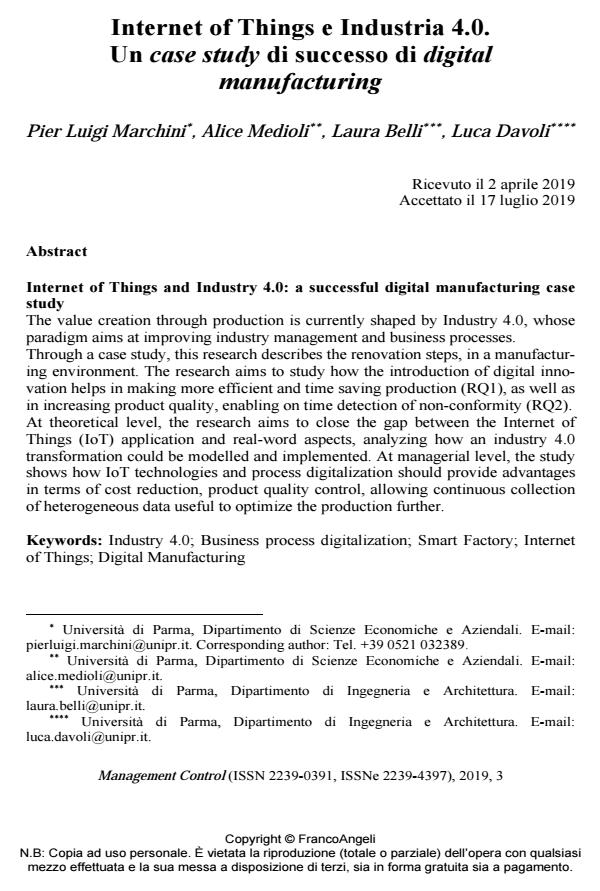Internet of Things e Industria 4.0. Un case study di successo di digital manufacturing
Journal title MANAGEMENT CONTROL
Author/s Pier Luigi Marchini, Alice Medioli, Laura Belli, Luca Davoli
Publishing Year 2019 Issue 2019/3
Language English Pages 24 P. 11-34 File size 256 KB
DOI 10.3280/MACO2019-003002
DOI is like a bar code for intellectual property: to have more infomation
click here
Below, you can see the article first page
If you want to buy this article in PDF format, you can do it, following the instructions to buy download credits

FrancoAngeli is member of Publishers International Linking Association, Inc (PILA), a not-for-profit association which run the CrossRef service enabling links to and from online scholarly content.
The value creation through production is currently shaped by Industry 4.0, whose paradigm aims at improving industry management and business processes. Through a case study, this research describes the renovation steps, in a manufac-turing environment. The research aims to study how the introduction of digital in-novation helps in making more efficient and time saving production (RQ1), as well as in increasing product quality, enabling on time detection of non-conformity (RQ2). At theoretical level, the research aims to close the gap between the Internet of Things (IoT) application and real-word aspects, analyzing how an industry 4.0 transformation could be modelled and implemented. At managerial level, the study shows how IoT technologies and process digitalization should provide ad-vantages in terms of cost reduction, product quality control, allowing continuous collection of heterogeneous data useful to optimize the production further.
Keywords: Industry 4.0; Business process digitalization; Smart Factory; Internet of Things; Digital Manufacturing
- Strategic innovation: exploring governance drivers of FinTech investments Luca Ferri, Flavio Spagnuolo, Ciro Troise, Annamaria Zampella, in Journal of Strategy and Management /2025 pp.521
DOI: 10.1108/JSMA-11-2024-0309 - Gestione integrata dei dati e performance aziendali Antonella Paolini, in MANAGEMENT CONTROL 2/2022 pp.5
DOI: 10.3280/MACO2022-002001 - Toward Industry 4.0 in home appliance industry: challenges and future perspectives Ali Morovati Sharifabadi, Mehran Ziaeian, Seyed Haidar Mirfakhradini, Seyed Mahmood Zanjirchi, in Journal of Advances in Management Research /2024 pp.354
DOI: 10.1108/JAMR-03-2023-0070 - Sustainability certifications as enablers of intellectual capital and digital transformation in SMEs Veronica Procacci, Martina Manzo, Tommaso Beck, Francesco Manca, in VINE Journal of Information and Knowledge Management Systems /2025 pp.1
DOI: 10.1108/VJIKMS-07-2025-0304 - The impact of digitalisation on professional football clubs Fabio Nappo, Alessandra Lardo, Maria Teresa Bianchi, Federico Schimperna, in MANAGEMENT CONTROL 2/2023 pp.117
DOI: 10.3280/MACO2023-002006 - L'implementazione di tecnologie 4.0 nelle piccole imprese: analisi di un caso di successo Paolo Bogarelli, Nicola Castellano, in MANAGEMENT CONTROL 2/2023 pp.137
DOI: 10.3280/MACO2023-002007
Pier Luigi Marchini, Alice Medioli, Laura Belli, Luca Davoli, Internet of Things e Industria 4.0. Un case study di successo di digital manufacturing in "MANAGEMENT CONTROL" 3/2019, pp 11-34, DOI: 10.3280/MACO2019-003002